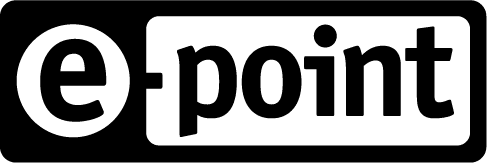Computerworld TOP 200 report — the year 2016 in the IT industry. e-point is enjoying an upward trend
The 25th jubilee edition of the report: "Computerworld TOP 200. Polish IT Market", is already available. The publication contains rankings of the most important Polish IT companies and experts’ comments on the condition of the IT industry. e-point is moving up in the rankings despite the general market slowdown.
Overall picture of the Polish IT industry
The year 2016 marked a temporary decline for IT in Poland — the industry’s revenues decreased by 5.2%. The total revenues of the entire modern technology market (including the telecommunications industry) were PLN 101.75 billion, i.e. 3.4% less than in 2015. This mainly results from a decreased contract rate in the public sector, among other things.
However, that market stagnation was short-lived and upward trends can already be observed in 2017. Representatives of the IT industry are optimistic: 61% predict that the situation will improve in 2018, and 9% believe that it will be markedly better. Only 4% of the industry representatives expect a deterioration.
"Companies’ expenditures on IT are going to increase," Ewa Zborowska from IDC states in the report. The highest year-on-year growth rate is projected for public administration and financial services.
According to the report, spending on information technology (hardware, software, and related services) in Central and Eastern Europe will amount to USD 62.58 billion in 2017 and will have exceeded USD 70.58 billion by 2020 — this means a projected 12.8% increase.
Today in Poland, the IT expenditures of the largest companies account for approx. 46% of all expenditure on IT — by 2020, their share will have increased to 48%. It is estimated that IT expenditures of medium-sized enterprises will not increase, however, it is a good idea to look closely at the micro-enterprise (1–9 employees) market — these companies account for 25% of IT expenditures in the country.
Digital Single Market
In May 2015, the European Commission endorsed the Digital Single Market (DSM) strategy. The strategy is aimed at boosting the European digital economy and developing solutions that will enable both EU citizens and EU entrepreneurs from all 28 markets to obtain free access to digital goods and services. This is good news for entrepreneurs, who will be able to enter every EU Member State with their digital portfolio.
"I believe that we must make much better use of the great opportunities offered by digital technologies, which know no borders".
"To do so, we will need to have the courage to break down national silos in telecoms regulation, in copyright and data protection legislation, in the management of radio waves and in the application of competition law."
The idea behind the strategy is that legislative solutions and infrastructure should not fall behind the business reality. Instead, regulations should be aimed at creating favourable conditions for the development of innovations, supporting free access of citizens to a wide range of goods, and ensuring security.
It is estimated that after the DSM is introduced in the EU, the GDP will grow by EUR 415 billion.
"The internet knows no borders, this is certainly true. The removal of barriers for companies’ expansion abroad within the Single Market is a good opportunity for SMEs and it opens up new possibilities for stimulating economy through e-commerce".
"On the other hand, the strategy seeks to enhance the digital competences of citizens in all EU Member States. The DSM offers benefits not only for entrepreneurs, but also for ordinary people — easier access to products and services from across the European Union."
Future of the banking sector
It is worth noting the special position of the financial sector. As Krzysztof Pielesiek points out, Polish banks are among the leaders of innovation. One of the most important trends is emphasis on Customer Experience.
"Banks are afraid of losing their relations with customers and being cast in the role of suppliers of money while their customers will use the services of third-party companies (e.g. FinTechs, BigTechs or other, more customer-friendly, banks). This is why it is crucial to develop applications that will not only be convenient, aesthetic, and useful. This is now evident. At the moment, it is necessary to go beyond customers’ expectations and affect their emotions".
In order to offer better Customer Experience, banks are adopting new technological solutions (e.g. chatbots) and are using the data that they have more effectively. This can involve management of customers’ financial products, support for bank employees, customer profiling, analysis of customer behaviour, and offer personalisation.
The sector is also preparing itself for the changes that the PSD-2 (Revised Payment Service Directive) is going to bring in January 2018 — it will certainly promote the growth of FinTechs, but will also introduce banks to new innovative business models.
e-point in the Computerworld Top 200 report
e-point was included in a total of 12 lists, enjoying a remarkable improvement in comparison with the previous years.
As for the IT Companies with the Highest Net Profit from the IT category, our company moved up 44 positions compared with the last year.
We were particularly pleased to be ranked 22nd on the list of The Largest Suppliers of IT Solutions and Services for the Trade Sector (up from 28th position) and 46th in the ranking of The Largest Suppliers of IT Solutions and Services for the Banking Sector (last year, we were 56th), as these sectors are of key importance for our company.
Moreover, e-point was ranked 11th in the category of The Largest Suppliers of Custom-Made Software. The strong position of e-point in this category stems from the fact that our company, along with just twelve other enterprises, offers the full range of services that take into account browser, online, mobile, desktop, and database applications and management support systems.
Moreover, e-point was listed as:
- the 28th Largest Supplier of Web Applications and Web Portals
- the 40th Largest Exporter of IT Solutions
- the 25th IT Company with the Largest Increase in Export Revenues
- the 42nd IT Company with the Largest Increase in Employment
- the 40th Largest Supplier of IT Solutions and Services for the Large Company and Corporation Sector
- the 40th Largest Supplier of Software
- the 39th Largest IT Capital Group Operating in Poland
An IT revolution lies ahead
Jakub Chabik predicts a qualitative change in information technology that signifies not only improvement in the existing solutions, but also a real breakthrough that will change our daily life and our business models.
Computers are no longer mere data-processing devices — they are beginning to participate in reality through its reception and modification. Smartphones, tablets, smartwatches, home appliances, and autonomous cars collect data and join the vast network of connected things. According to Gartner, the number of intelligent devices will reach 9 billion in 2017 and may reach a trillion in 2025.
In medicine, dramatic progress can be observed in diagnostics and in the possibilities of medical equipment. Due to the growing popularity of wearables, cloud computing systems will soon contain much better information on our health than we ourselves have.
In other words, we can expect digitalisation of man; at the same time, artificial intelligence mechanisms will take over many human tasks and professions. Even now, they are employed in business in areas such as making credit or insurance decisions, supporting supply chains in sales and logistics, sales analysis, and resource planning in operational management.
This is why it is so important to be prepared for that revolution — to be where our customers, partners, and employees are going to be.

